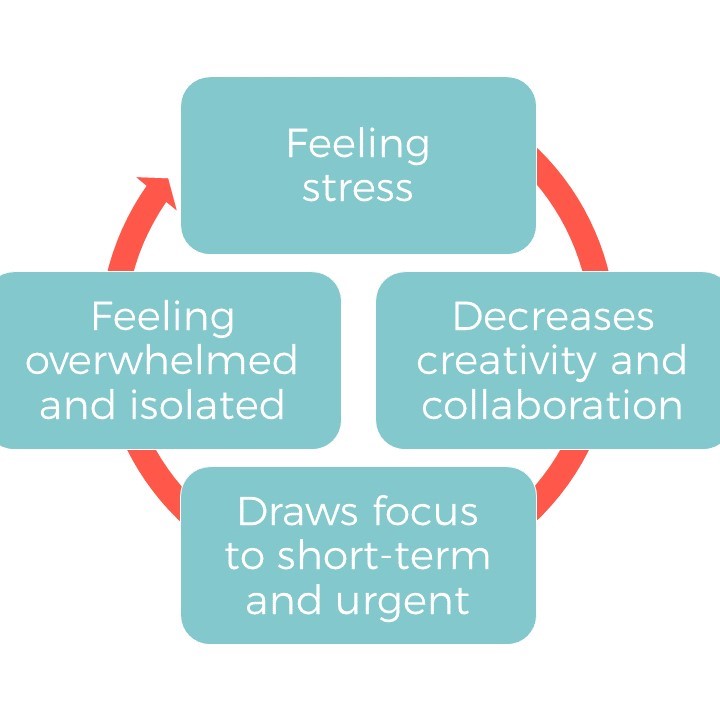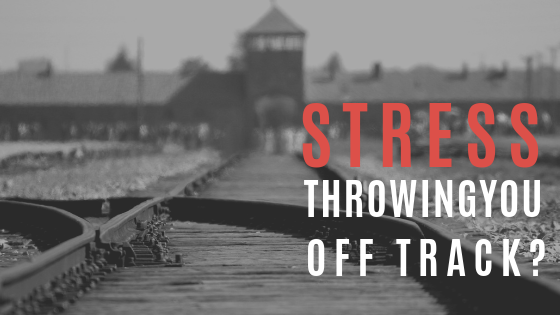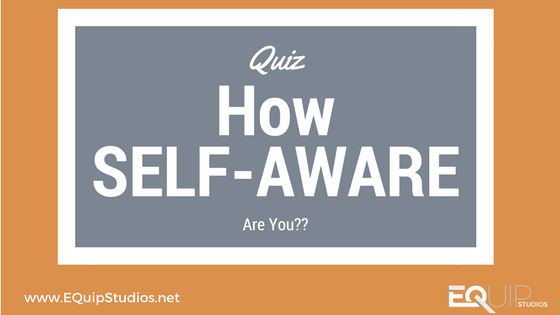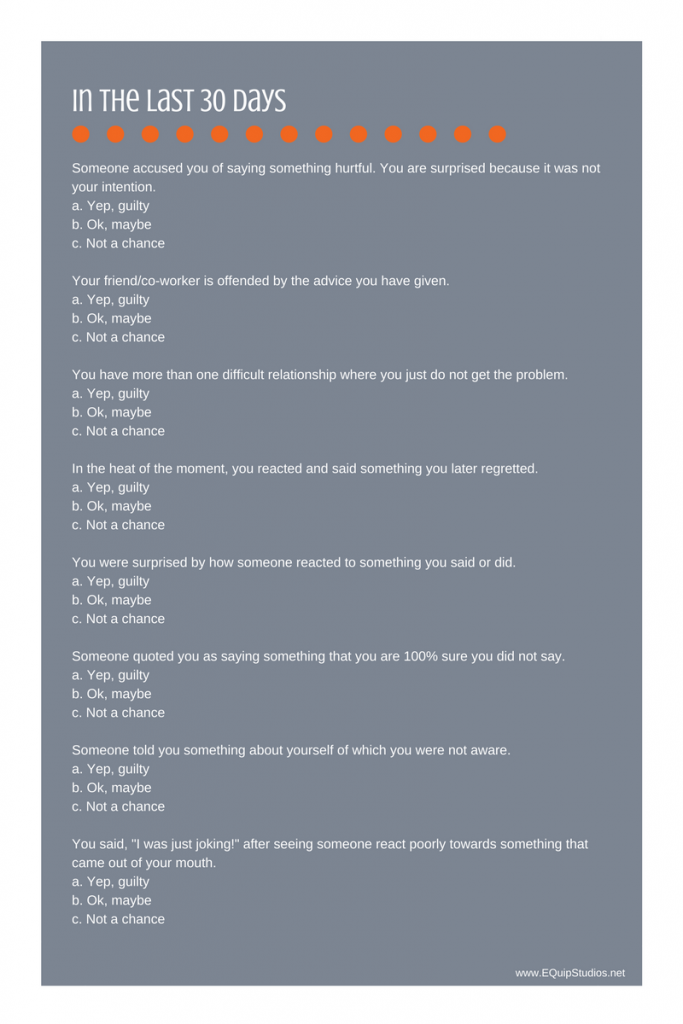EQ Tips
90% of High Performers Have This. Do You?
90% of High Performers Have This. Do You?
Recently, I had the privilege of leading a group of entrepreneurs, leaders, and change makers through a Developing Emotional Intelligence workshop. We worked together to bust the myths we often believe about emotions (yes all of the above statements are FALSE) and discovered the value emotions play in achieving our goals.
As a key take away, participants acknowledged that emotions, whether we know it or not, influence how we respond to change, navigate conflict, and go after our goals.
Emotions influence how we respond to change, navigate conflict, and go after our goals.
- Take a moment and identify a goal you have for this year.
(Example: increase staff engagement by 10%) - As you imagine yourself accomplishing this goal, make a list of everything that will be necessary to successfully achieve this goal.
(Example: new learning about engagement, open-mind, time, patience, desire, determination, innovative thinking, ability to listen more, connection, problem solving, etc.) - Draw a horizontal line. Label the line with the word INTELLIGENCE on the left and EMOTION on the right.
- Plot the items you listed that require your INTELLIGENCE on the left, EMOTIONS on the right, and everything else that might be combination of both somewhere inbetween. Don’t worry about a right or wong answer, just plot the items where you think they fit best.
- What do you notice about your continuum? Are more items on one side of the continnum over the other? Or are they balanced? How about the items in the middle?
- What would happen if you had the skills to achieve your goals, but not the emotions such as motivation, determination, perseverance, or optimism? Or, vice versa??
This continuum illustrates what emotional intelligence looks like in action. Things like prioritizing, problem solving, overcoming obstacles, handling conflict, making decisions, and influencing others, all fall into the middle area where both cognition and emotions play a part.
So what is emotional intelligence?
Simply put, emotional intelligence is being smart with your feelings. It’s the ability to blend thoughts AND feelings together so that you can be intentional with your words and actions.
Emotional Intelligence
It’s interesting to point out that 90% of the high performers have greater than average emotional intelligence.
90%!
There was a time when people believed that cognition and emotion were opposite. But neuroscience teaches us that our brains are both rational and emotional at once. Emotional Intelligence is not the opposite of intelligence, nor is it feelings trumping thoughts.
Emotional Intelligence is the unique intersection of both the head and the heart working together.
@icoacheq Tweet
Without emotional intelligence, either facts or emotions are driving your decisions and actions.With emotional intelligence, you are able to blend both the rational and emotional data together to intentionally choose how you want to respond.

The following are eight insights that participants of the workshop discovered as they considered how to jumpstart their Emotional Intelligence.
When it comes to achieving your goals:
Pay attention to the thoughts and feelings that run in the background and in the foreground throughout the day. How are they spurring you on toward your goal? How are they holding you back?
Rest in the emotion for a minute or so. Remember emotions are not good or bad. They are data. Resist the urge to stuff or ignore certain emotions. Instead, be curious about the emotions you are feeling.
As you notice your emotions, identify them by name, joy, sadness, anger, anticipation, etc. Naming emotions helps us to become more familiar with them, and to recognize patterns that occur with certain emotions. For more intense emotions, neuroscience teaches us that the simple act of naming your emotions can lessen the intensity of them.
The simple act of naming your #emotions can lessen the intensity of them. #EmotionalIntelligence
@icoachEQ Tweet
Try to identify the value that is in the feelings you are experiencing…all feelings including the ones you might think are “bad”. For example, when I feel frustrated, it helps me to recognize the importance of what I am doing. If I didn’t care, I wouldn’t be frustrated!
Notice what triggers a reaction from you as you work to accomplish your goal. Do you notice things like obstacles, challenges, different opinions, stress, etc triggering an auto-pilot reaction? Be curious to understand the trigger. When did it start? What feelings are associated with the trigger? How does this trigger hinder or support your ability to achieve your goal? What would be a more helpful response?
Consider the feelings and thoughts that would help you move closer to your goal. What currently gets in the way of experiencing these feelings and thoughts?
Identify the choices you have and take a few extra minutes to think beyond what’s right in front of you. What haven’t you thought of yet? What has helped you be successful in the past? What intrinsic values are attached to your goal? What is going to help you stay the course and persevere?
Imagine yourself getting closer to achieving your goal. How will it feel? What will be different? Why is this goal so important? What difference will it make in your life? What difference will it make in the life of others?

About Kelli Porcaro, PCC, EQAP, EQCC
Kelli brings 25+ years of Organizational Development experience to her work as a Consultant and Coach. She works in a wide range of industries unlocking infinite possibility with leadership development, instructional design, change management, and emotional intelligence.
Kelli also serves on Faculty at the Lake Forest Graduate School Management.
Stress Throwing You Off Track?
I recently conducted a workshop for business leaders focused on stress and the impact it has on collaboration. As part of the workshop, everyone participated in a short simulation. It involved 15 people working together under extremely tight time constraints. When the simulation came to an end, and the team fell short of achieving their goal, the group unanimously explained, “We didn’t have enough time!”
Doesn’t that sound familiar? A day doesn’t go by where I don’t feel pressed for time. I end up packing in way more than I should, and I eventually feel overwhelmed, distracted, and stretched too thin.
SO WHAT IS THE IMPACT OF THIS PATTERN OF BEHAVIOR?
Josh Freedman has a lot to say about this in his article, Stress is Killing Me. Time for Emotional Intelligence? It becomes difficult to focus on a solution when we are pressed for time. The additional pressure ignites a myriad of thoughts and feelings.
Thoughts: I’m never going to solve this. There’s not enough time. Everyone is in my way. Get out of my way. I’m so sick of doing this.
Feelings: Frustrated. Annoyed. Perplexed. Anxious. Defeated. Overwhelmed.
While some stress can actually be helpful, stress becomes toxic when you enter into a stress cycle with no plan or awareness on how to get out.

The Stress Cycle
There are days when I can get completely caught up in this stress cycle. I find myself saying, “If I can just get through these next couple of days, I’ll have more time for….”
And then I sit in my urgent focused state, shutting out the world around me and feeling disconnected. I don’t think my reaction to stress is that uncommon. And this is the problem.
The more stress we experience, the more we detach from the people around us. The very people we need most in these stressful situations.
I love Psychologist Kelly McGonigal’s TED TALK on the topic. She recommends perceiving stress as positive and encourages reaching out to others as a mechanism for stress reduction.
Back to the Workshop
As we debriefed the workshop activity it became clear to everyone, the lack of time created a sense of stress. This stress resulted in:
- People jumping in to try to solve the problem
- Some worked in groups of two
- Others worked in groups of three
- Others on their own
- Some just checked out
- No one worked together as a team, leveraging each others’ strengths and sharing the burden of coming up with a solution
And as a result:
- Communication shut down
- Planning was non-existent
- And random solutions were being tossed out with no success
Collaboration requires you to slow down, seek multiple perspectives and ideas to determine the best possible solution.
WHAT DRIVES YOUR ACTIONS?
During the workshop, participants completed a Six Seconds Brain Brief Profile to increase their self-awareness. The profile helped them to understand:
- Where they prefer to focus (facts or feelings)
- How they appraise situations (assess risk or assess opportunity)
- How they get energy (pragmatic action or long-term possibilities)
Our simulation helped to point out that emotions drive people, and people drive performance. Here are just a few of the observed actions that resulted from different feelings

About Kelli Porcaro, PCC, EQAP, EQCC
Kelli brings 25+ years of Organizational Development experience to her work as a Consultant and Coach. She works in a wide range of industries unlocking infinite possibility with leadership development, instructional design, change management, and emotional intelligence.
Kelli also serves on Faculty at the Lake Forest Graduate School Management.
Just how self-aware are you and why does it matter!? Take this short quiz and find out!
It seems no matter where you look, topics like mindfulness, emotional intelligence, self-awareness, and self-leadership are everywhere. So what do they have in common?
What is Self-Awareness?
Self-awareness is your ability to look inward and recognize your thoughts, feelings, motives, and drivers.
Why is Self-Awareness Important?
When your self-awareness is high, you are able to turn inward and:
- Navigate your emotions
- Apply consequential thinking
- Empathize with others
- Engage and connect with others in a meaningful way
- Predict your own and others’ responses
1. Well, that wasn’t my intention!
2. I was just trying to help.
3. What is her problem?
Well, if you find yourself asking that question more often then not, then there is a good chance that the answer may be YOU! In a challenging situation, consider how you might be adding to the stress.
4. I don’t know why I said that!
5. I don’t know why you would react like that?
6. That’s not what I said!
7. I had no idea that I do that!
8. I was just joking!
Developing Your Self-Awareness

About Kelli Porcaro, PCC, EQAP, EQCC
Kelli brings 25+ years of Organizational Development experience to her work as a Consultant and Coach. She works in a wide range of industries unlocking infinite possibility with leadership development, instructional design, change management, and emotional intelligence.
Kelli also serves on Faculty at the Lake Forest Graduate School Management.





